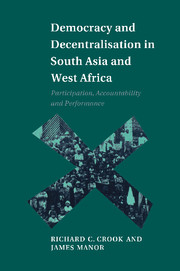3 - Bangladesh
Published online by Cambridge University Press: 12 October 2018
Summary
The structure of decentralization
The Bangladeshi experiment in democratic decentralisation was the creation of H. M. Ershad who had seized power in a military coup in 1982. His government created new elected councils at the sub-district (upazila or thana) level (with an average population of 245,000), and linked them to long-standing elected councils at the Union level much closer to the grassroots (with an average population of 20,000). There are 495 sub-districts and 4,401 Unions in Bangladesh. This system operated from 1985 until it was disbanded in 1991 after the fall of Ershad.
The sub-District Councils were more powerful than any such elected authorities in the history of Bangladesh. Their chairmen were directly elected while the other voting members included the heads of the eight to ten Union Councils within the sub-district's borders, plus four appointees: three women and a former freedom fighter. Non-voting members included the sub-district's chief civil servant and bureaucrats who oversaw the broad array of activities entrusted to the councils: agriculture, primary education, health and family planning, rural water supply, sanitation, Food for Work programmes, co-operatives and social welfare. The sub-District Councils served five-year terms and had modest revenue-raising powers, but they made limited use of them because the regime channelled abundant resources to them.
At the lower level in the system, the Union Councils (Parishads) consisted of a chairman and nine members, all of them elected for fiveyear terms, plus two women appointed by the central government. They were charged with maintaining law and order, and with mounting various development projects. Their resources were extremely limited, but this was compensated for by their chairman's membership on the well-funded sub-District Council. In theory, approval from the sub- District Council had to be obtained by a Union Council for its budget and taxes levied. The sub-District Council also decided what development projects (if any) were passed down to Union level. But since most voting members of the sub-District Council were heads of Union Councils, they obtained substantial resources.
Bureaucrats in development departments had previously been concentrated in the district headquarters, but they were deconcentrated to the sub-district level when councils there were created.
- Type
- Chapter
- Information
- Democracy and Decentralisation in South Asia and West Africa , pp. 85 - 135Publisher: Cambridge University PressPrint publication year: 1998

